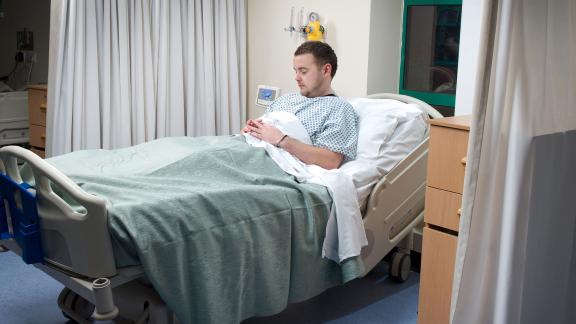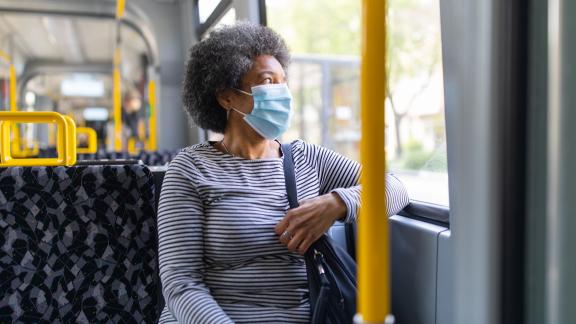A system approach to the demand crunch

This report outlines NHS leaders' views on what must be done to ensure the NHS does not become overwhelmed. It outlines what we can learn now in order to plan well as a system for the winter, and highlights ten areas of focus for local systems.
Key points
- The NHS is experiencing a surge in demand for services, most notably in urgent and emergency care, but also across community services, ambulance services, mental health and primary care. Some hospitals are having to stand down some elective and cancer care as a result of rising COVID-19 numbers. NHS leaders are reporting that the demand they are experiencing in the summer is akin to the pressure they usually experience in winter.
- NHS leaders are clear that emergency departments cannot be the system point of failure. Steps need to be taken now to ensure the wider health and care system is able to manage the multiple demands that will be placed on local services as we head into the traditionally busy winter months.
- The pressures felt across all parts of the system can only be overcome by working in a truly integrated way. We must be collectively honest about the challenges and the support needed and, ultimately, we must allow local leaders to lead.
- Despite the pressures, NHS leaders and their teams are delivering innovative changes to patient pathways to improve both quality and responsiveness. Examples include new intermediate pathways for children and young people presenting with an eating disorder to avoid admission; effective use of nurse triage models in rapid assessment areas; same-day access to diagnostics; better use of advice and guidance with generalists and specialists working better together to avoid admission; and effective management of the patient treatment list by sharing patient data.
- We have been working with NHS leaders from across the system to explore the practical measures that need to be put in place to enable the NHS to respond to rapidly rising demand. The focus was on what we can learn now to plan well – as a system – for the winter. In this report we outline ten areas of focus for local systems.
Introduction
COVID-19 admissions and deaths are reasonably low but rising again in many parts of the country. With over 80 per cent of the county now double vaccinated, the link between infection, hospital admissions and death has been significantly weakened.
However, at the same time, the NHS is experiencing a surge in demand for other services, most notably urgent and emergency care. The most emblematic symbol of escalating demand for NHS services is the image of ambulances queueing at the acute trust A&E department ‘front door’. This has become an increasing feature in recent weeks, driven by signs of pressure across the whole system with primary care seeing huge pressure and the knock-on effects of COVID-19.
NHS leaders are reporting that the demand they are currently experiencing in the summer is akin to the pressure they usually experience in winter. And as we head into the traditionally busy winter months, steps need to be taken now to ensure the wider health and care system is able to manage the multiple demands that will be placed on local services.
Methodology
The NHS Confederation has been working with NHS leaders from across the system to explore the practical measures that need to be put in place to enable the NHS to respond to rapidly rising demand for services.
We held a private roundtable, hosted by our chief executive Matthew Taylor and the director of our Acute Network, James Devine, which bought together leaders from acute, community, mental health, ambulance services and primary care. They told us of the extreme pressures their organisations are under and, most importantly, what must be done in order to ensure the NHS does not become overwhelmed. The focus was on what we can learn now in order to plan well – as a system – for the winter.
Findings
It was clear from the discussion that all parts of the health and care system are under immense pressure. What was equally clear was that this group of leaders were committed to developing system solutions. There is no doubt that the current pressures felt across all parts of the system can only be overcome by working in a truly integrated way.
The combined impact of high demand for primary care, including GP appointments and urgent care, ambulances, elective recovery programmes, increase in COVID-19 positive patients and access to mental health provision, all result in asking an already tired workforce to do more. But most importantly perhaps, is the need for true integration and an opportunity to ‘transform our way out of it,’ as one member described.
During previous waves of the pandemic we saw organisational boundaries discarded and we must maintain this collaboration as we continue to experience a ‘winter in summer’. Many of our members are unusually reporting Opel 4 or black alerts due to the pressures they are facing.
In addition, some hospitals are having to stand down some elective and cancer care as a result of rising COVID-19 numbers. We have previously described how small numbers can create big problems and it is clear that the impact is being felt heavily both by NHS colleagues and by our patients, as a result of further delays in care.
During the roundtable, members reported the operational impact of these pressures. Aside from demand in primary care being reported as unprecedented, and missed performance targets, there was a shared understanding that delays in offloading ambulances, crowding in emergency departments and delays in transfers of care to community settings were all quality and safety risks that could justifiably prompt intervention from the Care Quality Commission or NHS England and NHS Improvement.
It was important therefore for all NHS leaders to be clear on what was needed from each other across the system, but also to be clear on what was needed from regulatory and improvement colleagues prior to them believing that intervention is the only action.
Despite the pressures, we heard of NHS leaders taking the lead on innovative changes to patient pathways to improve both quality and responsiveness. Examples included a new intermediate pathway for children and young people presenting with an eating disorder to avoid admission; effective use of nurse triage models in rapid assessment areas; same-day access to diagnostics; better use of advice and guidance with generalists and specialists working better together to avoid admission; and effective management of the patient treatment list by sharing patient data.
However, as was said repeatedly during the roundtable: ‘we must be clear on what we need’ and avoid passivity in the face of adversity. There are competing demands for all parts of the system. It was widely acknowledged that emergency departments cannot be the system point of failure during these pressured times; that we cannot go back to our respective corners to avoid healthy conflict about change; and that we must be collectively honest about the challenges and the support needed. Ultimately, we must allow local leaders to lead, and it was clear from the roundtable that NHS leaders are leading with compassion, determination and authenticity.
Ten key areas for local systems
Our discussions with NHS leaders identified ten areas of focus for local systems:
- Clarity on the funding model, including but not limited to the following:
- Discharge to assess monies. This is due to end at the end of September 2021 and should be extended for the second half of the year. Otherwise, thousands of medically ‘optimised’ patients risk being kept in hospital for longer than needed.
- Second half of the year financial position. This has still to be confirmed and NHS leaders are unable to make key decisions on staffing levels without knowing what their budgets will be from October onwards.
- Expected efficiency targets for M7-M12 of 2021/22, which are thought to be in the order of 1.5 per cent.
- Money available for capital projects to support demand today, and predicted demand in winter.
- 24/7 urgent care models for mental health.
- Long-term psychological support for health and care colleagues, with an extension of the £15 milion funding for the NHS support hubs.
- Extended hours to aspects of primary care complete with maximised walk-in facilities and remote consultation.
- A consistent approach from regulatory and improvement colleagues. The experience is variable across the country ranging from supportive to appearing more punitive. There needs to be a better system approach to risk management to avoid organisational intervention for system issues.
- A national approach to addressing health inequalities, which are being exacerbated by the lengthy delays in care and the growing backlog. What is the role of the independent sector to enhance capacity? How is the backlog being reviewed to ensure the long waits do not further widen the gap of inequality and outcome?
- More effective performance measures, based on interdependencies and collaboration and linked to system working and a more nuanced quality outcome focus for referral to treatment, similar to emergency care.
- System solutions for staying in touch with patients on the waiting list:
- Sharing of the patient treatment list across all parts of health and care via an enhanced digital approach.
- Effective use of pre-hab models to improve post-surgical outcomes.
- Implementation of ‘waiting well’ models, utilising an alternative workforce or digital approach.
- Is the 18-week standard fit for purpose? Will it contribute to health inequalities, and does it now focus on outcome rather than responsiveness?
- Improved social care packages to avoid longer-than-necessary stays in hospitals due to a lack of community provision, linked to clarity on discharge to assess monies and collaboration with local authorities.
- A system plan for elective recovery over winter particularly, to avoid further delays in care or cancellations of elective programmes entirely.
How the NHS Confederation is supporting members
We have heard from members across the whole of the system that they are facing severe demand. Our Winter in Summer briefing set out the challenges members are facing and the need for financial clarity for the rest of the year to support this demand. These issues were outlined in a letter to the Chancellor, which also recognised the need for certainty about discharge to assess funding and the issues that will arise from discontinuing it. We will also be influencing the upcoming Comprehensive Spending Review to ensure health and care gets what it needs, as well as putting pressure on the government for social care reform.
We have been working with our members and Proud2beOps to understand the elective recovery situation and share ideas and learning across our membership. We held a roundtable with leaders across England to look at the diagnostic and elective backlog and the challenge of maintaining a health inequalities focus as the lists increase. We are continuing this work.
We have also launched the #NotTooMuchToMask campaign, which asks the public to make pledges to continue with actions that can slow down the spread of infection. You can read more about why we felt this campaign was needed in a blog by our chief executive, Matthew Taylor.



